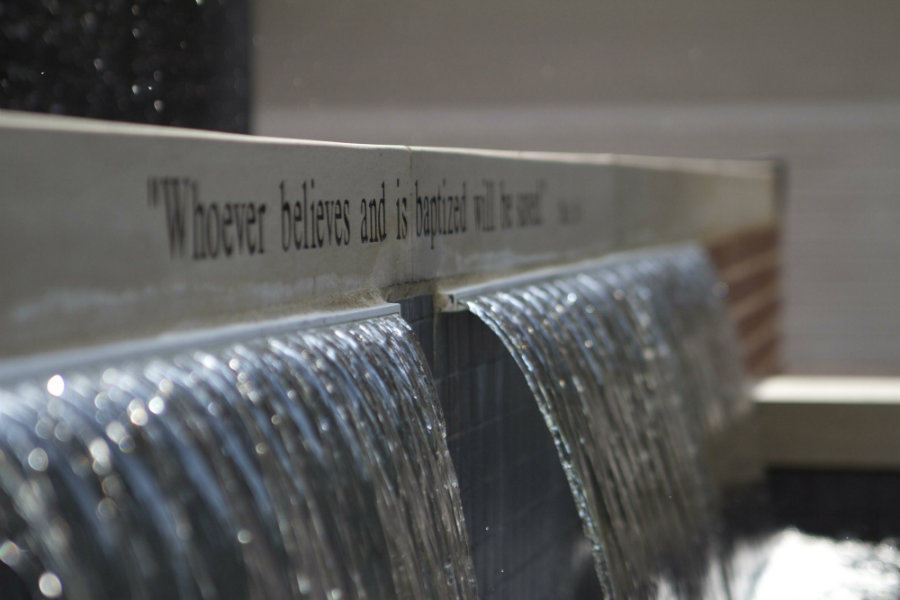More than chapel, the Office of Spiritual Formation uses change to cultivate community this academic year
Cate Zenzen |

To best prioritize student well-being, the Student Life team has a new structure that encapsulates all areas of campus life. Beneath the emphasis on Vocation and Formation lies the Office of Spiritual Formation where Deron Smith, Falon Barton and Brent Roe-Hall work to provide opportunities of growth for the entire campus. They are excited to use virtual platforms for students to connect, the community to grow together, and for God to continue His work at Lipscomb.
“The overall vision is to create space and opportunity for holistic formation. It is a holistic pursuit in community, in the power of the spirit, for the sake of Jesus. It’s going to be some formal programs and events, but also nurturing an entire culture in which every student and every faculty and staff member is pursuing Christ with a life open to the Spirit’s transformation,” said Smith, Dean of Vocation and Spiritual Formation.
To continue the holistic approach, Vocation and Formation covers Career Development, Veteran Services and Spiritual Formation, and fits within the Student Life Team. Student Life consists of a number of offices including Security and Safety, Housing and Residence Life, the Counseling Center and Community Life. The entire team surrounds students on all sides, and each office provides the support students need in different areas of life.
With the understanding that students may not be physically together this semester, the team will ensure students do not feel alone. This will include contacting students who are sick and in isolation, as well as the introduction of the Lipscomb Mentoring Network. Called the Joshua Project in the past, this mentoring program will consist of a larger, more substantive structure so that every freshman student is surrounded by a couple of mentors. While this initiative was in motion long before COVID, Roe-Hall feels the timing fits well with the context of the upcoming semester. Not only is the Office of Spiritual Formation adapting to a new way of life, but they are hopeful in the ways it will bring growth to the Lipscomb community.
“What we know from scripture, and what we know from life experience, is that these seasons of challenge, trial, death, darkness and uncertainty are moments where God meets us in really powerful ways — both as a community and as individuals,” said Barton, Director of Spiritual Formation.
While experiences of formation can only be created by God, Barton said their office will focus on how to facilitate those experiences. Work, school, and life as a whole will look different, but with the resources available — particularly technology — connection and collaboration can still occur.
While chapel is not the only formational experience students have at Lipscomb, the Office of Spiritual Formation ensures these times of connection will continue to be important. This semester, the team hopes to really emphasize that chapel is a time of communal rhythm, a practice that keeps the Lipscomb community informed and rooted together. The Gathering, the campus-wide assemblage, will continue to take place at 10:55 am each Tuesday, but presented virtually. Instead of guest speakers presenting, the weekly message will be delivered by Lipscomb faculty, staff and students, and can be viewed throughout the week. This year’s theme will focus on the Beatitudes, part of Jesus’ Sermon on the Mount as told by the book of Matthew.
“By rooting ourselves in the Beatitudes, we hope to cultivate a community that loves who Jesus embraced and practices what Jesus taught. We felt these characteristics were timely, given the context of this semester, but also a really powerful compass in our lives no matter what season we’re in,” said Roe-Hall, Director of Vocation Formation.
As for the Thursday Breakouts, students will now commit to and attend the same session every week. With most of them limited to 50 students or fewer, these smaller groups will enable participants to connect with faculty, staff and student leaders beyond the classroom setting. Many of these are virtual as well.
“I’m really excited by the huge array of breakouts. Last semester we had 14 to 20 breakouts and now we have 52 lined up. I’ve been recruiting leaders and people have been so excited for this new format. They are able to tap into their own passions and share them with students in a way that is meaningful, spiritually formative, and community building,” said Barton.
With leaders from all over the Lipscomb community, the overall scope of Breakout options reflects the integration of human nature. Barton emphasizes that God is not compartmentalized, but in every part of our lives. She hopes this method of meeting and growing together will help the cultural transition of connecting in new ways easier. Throughout the semester, Barton will compile and share a list of virtual resources that facilitate connection in order to cultivate the human need for relationships.
“We have such a diverse community so trying to get everyone on campus in the same room at the same time can be really difficult. The beauty of virtual platforms is that it’s much easier for everyone in our community to access, to join in, and even to contribute to this communal rhythm. COVID has forced us to slow down, so I hope that introducing a rhythm instead of a requirement will help combat that need to constantly go,” said Roe-Hall.
While the Office of Spiritual Formation recognizes the many challenges the Lipscomb Community may face this semester, they are expectant of spiritual and relational growth. Barton, Roe-Hall and Smith look forward to experiencing grace in new ways, the wisdom that will come from God, and the capacity for creativity in this season.